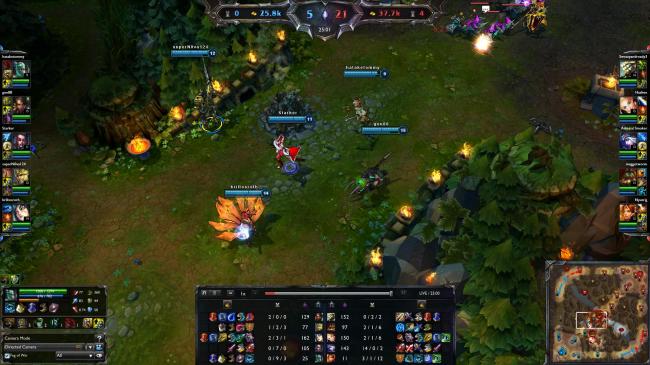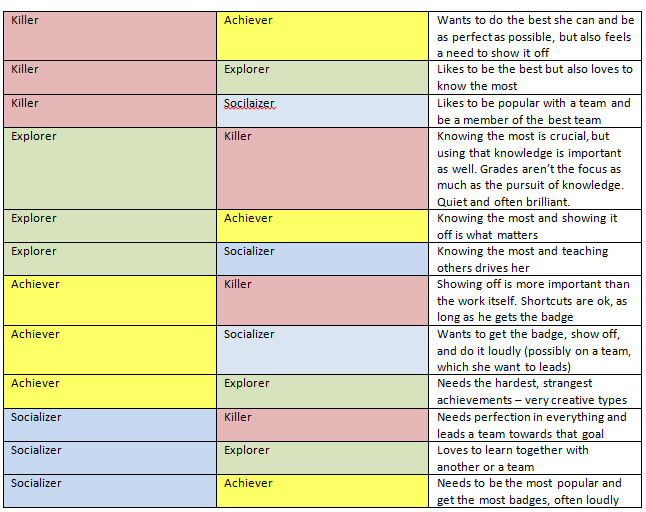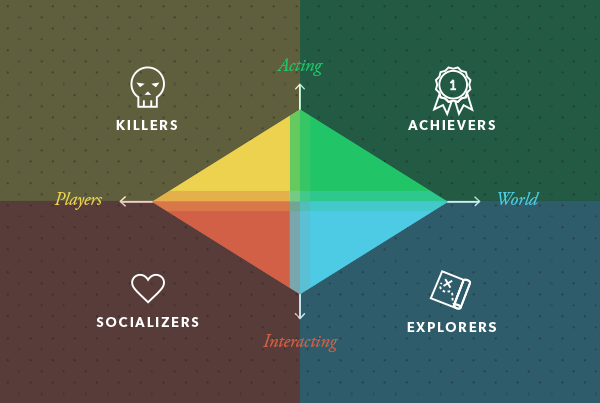A few years ago, at the behest of a friend of mine, I took the Bartle Test of Gamer Psychology. Naturally, I didn’t think that an online test to judge my “gamer psyche” would be valid, nor did I think, contrary to what I had been told, that I would learn anything that I could use to positively impact myself or my students. Looking back, I can see that I was misguided.
The Bartle Test is designed to classify players of online multiplayer games (like MMORPGs or online shooters – really any complex multiplayer game) based on their gaming style.
There are four possible outcomes based on a series of 30 either-or questions. After completing the test, you are given a Bartle Quotient, which totals your percentages across all four outcomes. For example, when I took the test I turned out to be 100% killer, 87% explorer, 60% achiever, and 20% socializer. Now, this doesn’t mean that I’m a sociopath bent on murder and violence, but rather that when I play games (especially multiplayer games) I enjoy the thrill of competition with others and I like to employ tactics and cunning to win for my team. In single player games, I thrive on development, and I max level my character to be the most virtuous (or most venomous) that I can be. I enjoy games that require either strategy or ridiculous feats of daring. As an explorer, I absolutely love open worlds with hidden gems, gear, and lore that I can find (and that ideally not many other people have found). Combining my strongest attributes, the test concluded that as a killer-explorer I enjoy taking on the role of a crusader or marauder in a vast world, who seeks challenges against other players but also knows everything about the world such as lore, hidden spots, and gear locations. This pretty much sums up the way I play most MMOs, so I was happy with the results.
I had several of my students who game take the Bartle test at the beginning of last school year. I chose six boys and three girls who played a variety of games from Minecraft and League of Legends to Call of Duty and Assassin’s Creed. Of the boys, all six were primarily killers (no surprise there) and of the girls, two were achievers and one was a socializer (again, no real surprise). What was surprising however, was how their overall outcomes combined. One boy, (we’ll call him Jose) who’s usually a pain in the ass, turned out to be like me, a killer-explorer. I too was a pain in the ass in school, so I began to think about how this gamer profile might be used when I gamify things in my class. As I’ve learned in education, gamification can’t just be handing out badges and stickers for arbitrary achievements. There has to be some real game design. Jose isn’t phased by earning achievements (his lowest outcome was in achievement) but he is all about showing off in front of peers and “killing” his work to do so. One of the girls (we’ll call her Jackie) turned out to be an achiever-killer. That meant that when I gamified projects, she didn’t care at all what new insights she gained from exploring the content and she’s a pretty terrible team player. Jackie’s all about getting a grade and showing it off. Her partner, a socializer-achiever, doesn’t care as much about the new content either but as long as she gets to be the “den mother” of the group and gets a grade, she’s good to go.

The Bartle Test gave me some real insight into how I could gamify all kinds of things in life. This year, all of my students too the test during the first week of school and in addition to using all of the nifty teacher data that we use, I am able to form groups and teams based on the Bartle information. I make sure that I have everyone represented on a team (too many killers and not enough achievers and socialzers isn’t a great mix) and I try to take kids who aren’t about exploring and broaden their interests and expose them to a larger world. The people (like me) who aren’t big socializers become integral parts of a group which leverage their strengths, making them better at socialization.

I created the chart above for myself and a friend who has also gamified his classroom as a reference when we’re grouping kids. It applies to each of us as gamers though. In my daily life, questing my way toward a final goal as it were, I do tend toward wanting to be the best (as a perfectionist) but I also deeply value knowledge and information. I avoid making decisions if I don’t have all of the information and I won’t enter an argument unless I’m confident that I’ll win. All of this is supported by my gamer type (killer-explorer). I also hate exercising in a gym because, even though I can “kill” the workout and I can see personal growth, I don’t get to explore and it’s extremely boring and mundane. Realizing this, I try to get out and do a variety of physical activities that stimulate my need to explore and keep learning. Knowing your gamer psychology can really help you gamify things that you otherwise find boring or lame, and can help you know yourself as a gamer. It’s definitely helped my kids learn more and can help make positive changes elsewhere as well. Take the Bartle Test of Gamer Psychology here
